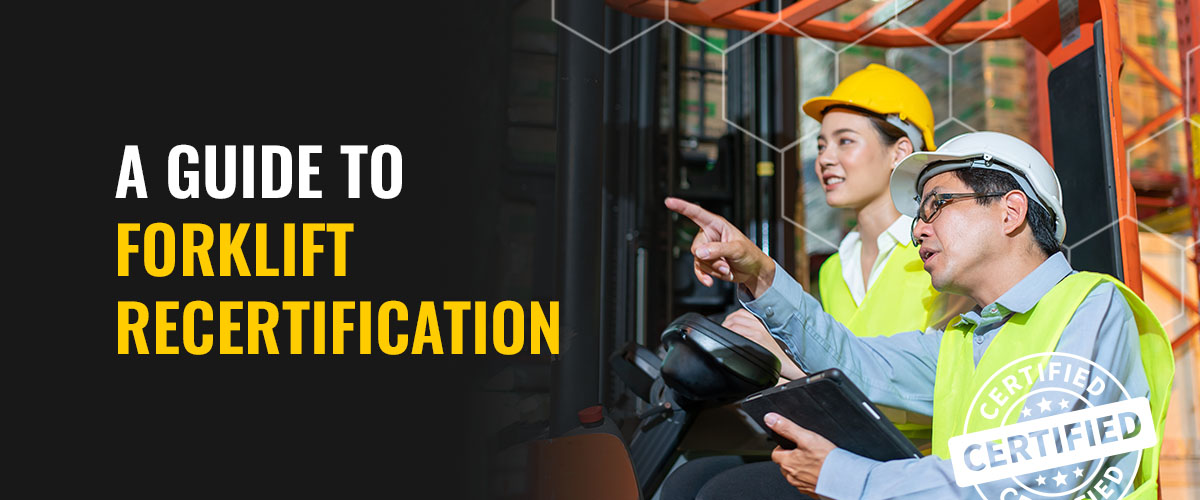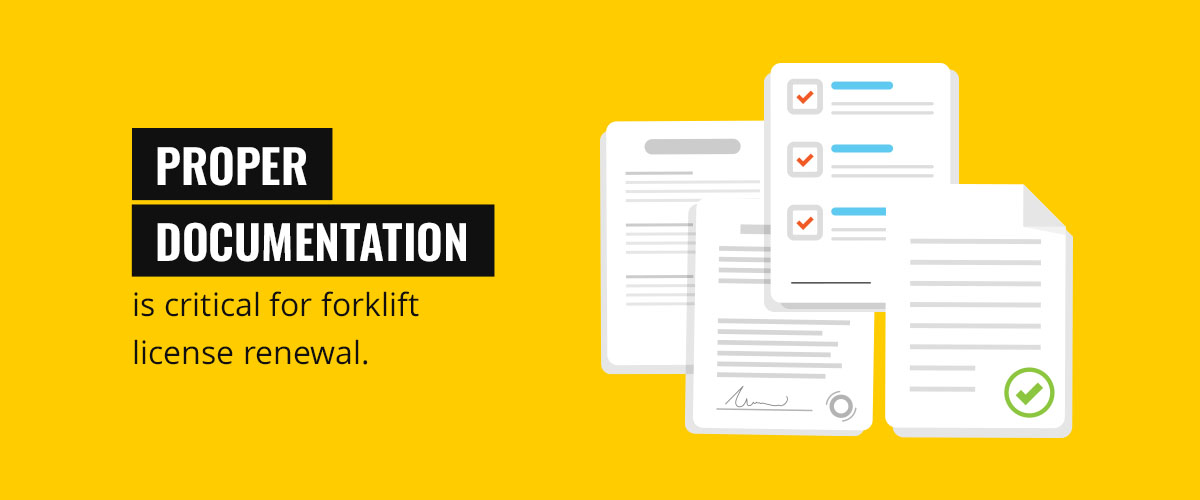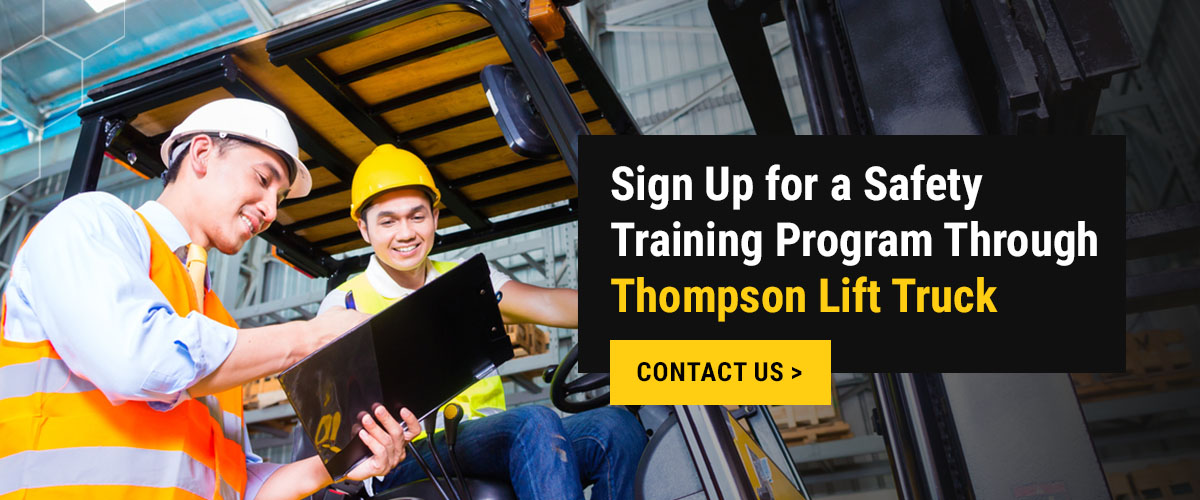
A Guide to Forklift Recertification

Regulations governing forklift operations change over time. Therefore, what was compliant a few years ago might not meet today’s standards — OSHA updates safety guidelines and certification requirements to keep pace with emerging technologies and best practices.
As industries adapt to evolving demands, so do their operational processes. If your workplace has introduced new forklift models or altered its material handling procedures, your certification might no longer be applicable. Ensuring you’re certified for the equipment and processes you encounter daily is crucial for safety and efficiency.
How Often Does a Forklift Trainer Need to Be Recertified?
The frequency of forklift recertification varies depending on regulatory requirements, workplace incidents, equipment or procedural changes, and ongoing training and assessments. Here are some factors to consider if you need to renew your certification:
- Regulatory requirements: Different regions and jurisdictions have varying regulations regarding forklift operator certification renewal. It’s crucial to stay informed about the specific forklift recertification requirements in your area. In some cases, recertification is required every three years, but that time period can vary.
- Workplace incidents: Recertification may be mandated if your organization experiences a significant forklift-related incident. This is often a safety precaution to ensure operators operate equipment correctly and safely.
- Changes in equipment or procedures: New equipment may have different features or handling characteristics that operators must be trained on to operate safely.
- Continuous training: Regular training sessions, safety meetings, and refresher courses can help keep forklift operators sharp and aware of evolving safety guidelines.
- Internal assessments: Consider conducting regular internal assessments of forklift operators’ skills and knowledge. This can help identify areas where additional training or recertification may be necessary. Internal assessments also serve as proactive measures to mitigate potential safety risks.
How to Renew a Forklift License
Learn how to renew a forklift license in this step-by-step guide for professionals:
- Know your local regulations: The first step in the renewal process is to understand the specific regulations and requirements for forklift license renewal in your area. Different jurisdictions may have varying renewal timelines, prerequisites, and documentation needs. Consult your local regulatory authority or OSHA forklift recertification guidelines for precise information.
- Schedule recertification training: Once you know your location’s requirements, schedule recertification training for your forklift operators. Accredited training organizations or certified trainers typically provide this training. Ensure the training program adheres to the latest safety standards and covers the specific types of forklifts your operators use.
- Attend recertification classes: Forklift classes refresh operators’ knowledge and skills. These classes typically include both theoretical and practical components.
- Pass written and practical exams: After completing the recertification courses, operators must pass the courses to demonstrate their understanding and proficiency. These exams are structured to assess their knowledge of safety protocols, equipment handling, and ability to perform tasks safely and efficiently.
- Keep track of documentation and records: Proper documentation is critical for forklift license renewal. Ensure all training records, exam results, and certifications are accurately maintained. This documentation proves compliance and can be vital during audits or inspections.
- Regularly review safety procedures: Forklift operators should undergo recertification when required and regularly review safety procedures and best practices. Conduct safety meetings, provide access to updated training materials, and encourage operators to stay informed about any changes in regulations or equipment.
- Monitor operator performance: As part of a proactive safety culture, continuously monitor operator performance. Regularly assess their adherence to safety protocols and their handling of forklifts. If any issues or unsafe practices are identified, address them promptly through additional training or corrective actions.
- Stay informed about equipment changes: If your organization introduces new forklift models or modifications to existing equipment, ensure operators receive training specific to these changes. This is crucial for maintaining safety and efficiency in the workplace.
- Keep a renewal calendar: To avoid lapses in certification and potential compliance issues, maintain a renewal calendar. This calendar should include the expiration dates of operator certifications, ensuring renewals are initiated well before expiration.
- Foster a safety culture: Ultimately, forklift license renewal is also about fostering a safety-first culture within your organization. Encourage open communication about safety concerns, provide resources for continuous learning, and recognize and reward operators for their commitment to safety.
What Happens if Your Forklift License Lapses?
An outdated forklift license can lead to many problems for individual operators, the organization, and fleet management as a whole.
Legal Implications
Operating a forklift without a valid license breaches regulatory compliance and local laws in many jurisdictions. This can result in legal penalties, fines, and potential liability in case of accidents or injuries. Organizations may also face legal repercussions for allowing unlicensed operators to work with forklifts.
Ensure all operators undergo the necessary recertification training and exams to reinstate their licenses.
Safety Risks
Lapsed licenses often mean operators still need to receive the latest safety training or updates on equipment handling procedures. This poses significant safety risks in the workplace. Improperly trained operators are more likely to cause accidents, damage goods, and put themselves and others at risk.
Organizations should prioritize safety training and retraining for operators with lapsed licenses to mitigate safety risks. This includes both theoretical knowledge and practical skills assessments. Operators must demonstrate their ability to handle forklifts safely before resuming operations.
Workplace Efficiency
Lapsed licenses can disrupt the efficiency of your material handling operations. Unlicensed operators may be less proficient and more prone to accidents, leading to delays in tasks, damaged goods, and increased downtime. Well-trained operators contribute to smoother and more productive operations.
Sign Up for a Safety Training Program Through Thompson Lift Truck
At Thomas Lift Truck, we understand that different companies have unique needs and preferences regarding forklift safety training. Whether you choose to have your own staff instructors or leverage our expert guidance, we can support you in creating a comprehensive forklift safety training program. Our commitment to safety extends to offering all the necessary materials for purchase. Additionally, for those who prefer assistance, we offer “Train the Trainer” sessions conducted by our factory-trained instructors.
Your employees are invaluable assets, and investing in an effective forklift safety training program can significantly reduce the number of accidents and create a safer work environment. By prioritizing ongoing training, recertification, and fostering a culture of safety, you meet regulatory requirements and demonstrate your commitment to the well-being of your team. Contact us for more information today.


